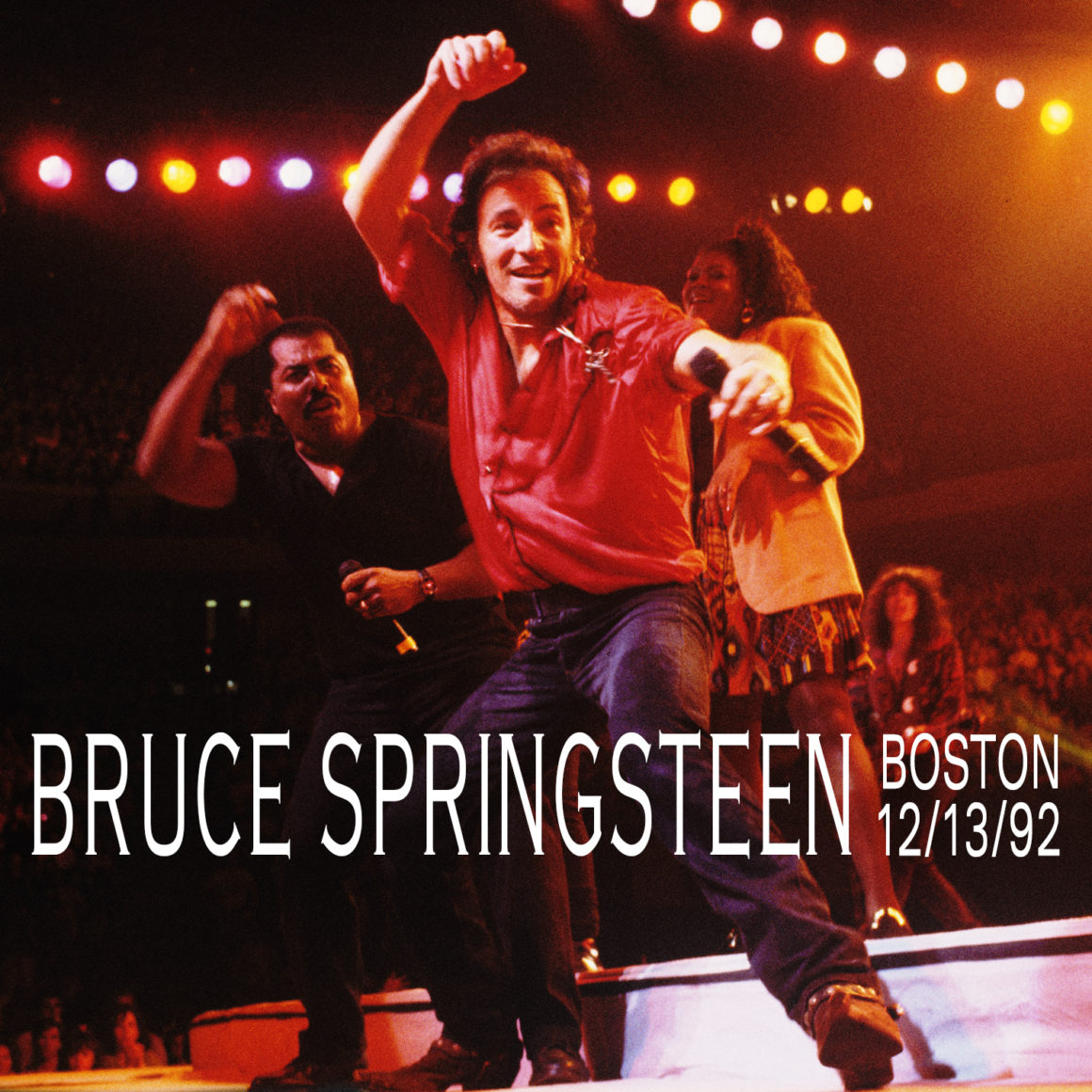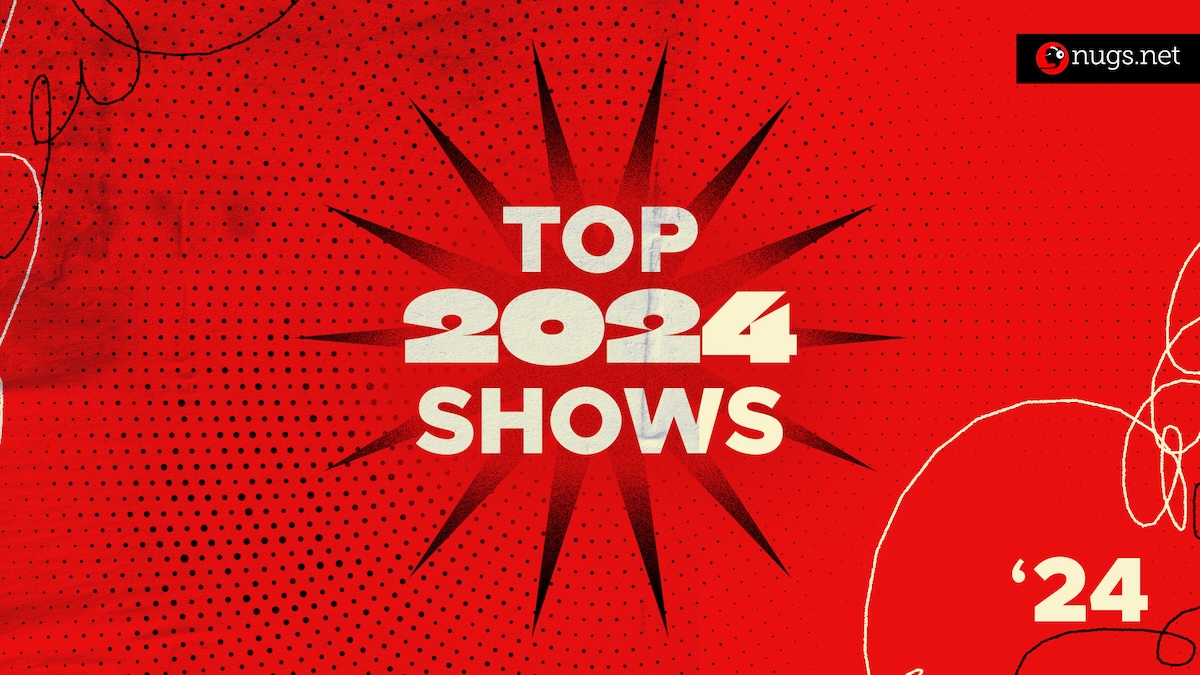Thousands of Miles for Some Rock and Soul

LISTEN NOW: Boston Gardens, Boston, MA, December 13, 1992
By Erik Flannigan
It has been some time since the Live Archive series revisited Bruce Springsteen’s 1992-93 World Tour in support of Human Touch and Lucky Town. This chapter in his live performance history can be tricky to contextualize, in part because it’s a rare full-band tour that does not list E Street as its home address. As such, there’s no point comparing “Born to Run” played by the 1992-93 band to an E Street Band performance from any year, because there is simply no comparison. That’s okay. It was never their mission.
The selection of Boston 12/13/92 is driven by a setlist that features 16 songs from Human Touch and Lucky Town, many of which never graduated to the Reunion era. Bruce assembled his new, expanded band with that recent music in mind, not “Darkness on the Edge of Town” (though, to be fair, they play the latter rather well). The one constant from E Street to the new crew was Roy Bittan, with whom Springsteen co-wrote “Roll of the Dice” and “Real World” for Human Touch.
I’ve always viewed the 1992-93 band as an attempt to mix roots-rock with gospel-influenced soul music and reminiscent of Bob Dylan’s 1986 True Confessions tour, which saw him backed by Tom Petty and the Heartbreakers augmented by the Queens of Rhythm backing singers. In fact, it was the late Debbie Gold, a mutual friend of both Dylan and Springsteen, who encouraged the former to work with Petty and helped the latter assemble his 1992-93 touring musicians.
If anything, Bruce was tipping that mix toward soul. The catch was that much of his new music featured heavy synthesizers and keyboards. Synthesizers and classic soul can mix marvelously (see Aretha Franklin’s “Freeway of Love”), but it requires very particular attributes. There are many words one could use to describe the extraordinary talent of Roy Bittan as a keyboard player, but funky is not one of them.
Boston 12/13/92 effectively captures the strengths and stretches fundamental to the 1992-93 tour. Listening anew proves refreshing, as several HT/LT songs and other arrangements are distinct from the many E Street Band performances that followed. As fluent as many of us were in the sound of that tour at the time, hearing it now is an entertaining time tunnel to a unique period.
Jon Altschiller’s multitrack mix puts Bittan first chair on the bandshell, and you’ll hear the Professor loud and proud as the show starts winningly with “Better Days,” “Local Hero,” and “Lucky Town.” The aforementioned “Darkness” follows, with Roy hard right channel, guitarist Shayne Fontayne hard left. It isn’t a classic version, but a compelling one just the same, with intriguing vocal rephrasing from Springsteen, a frequent event this night. The song ends not with Bruce’s voice but a gorgeous vocal run from Angel Rogers.
“The Big Muddy” gets an infrequent airing here. It’s a kind of swampy, narrative cousin to “Atlantic City” that rides a big Bruce vocal and sinewy synth work from Bittan. “57 Channels (And Nothin’ On)” taps television news audio a la U2’s Zoo TV tour, but the attempt to graft the social issues of a post-Rodney-King-verdict America on to a humorous ditty about modern media remains a difficult sell.
Things get back on track with an excellent version of “Trapped” that showcases the powerhouse voices Bruce assembled as his choir. I love the way he biblically tweaks, “good conquers evil, the truth sets you free.” “Badlands” is highly credible, too, filled with small arrangement changes that pulled me into a song that has been played the same way by the E Street Band forever.
The emotional heart of Lucky Town is the life-affirming “Living Proof,” written by Sprinsteen after the birth of his first son. Boston gets an excellent performance, vocal nuances reinforcing that Springsteen is in the moment. The same can be said for “If I Shall Fall Behind.” I prefer this arrangement to the Reunion edition, with lush harmonica and dark synthesizer tones along with a robust Bruce vocal. Listen for how the harp and keyboards play off each other at the end.
Bruce makes the title literal in “Leap of Faith.” We can clearly hear when he enters the crowd, with a funny “Whoa, oh!” soon followed by a surely deserved “Yikes!” The backing singers are at their church-choir best, lending the song gospel gravitas. Bobby King moves front and center for “Man’s Job.” Beneath those period synths a classic soul song is fighting to be heard, one that could have been the uptempo A-side to a “Back In Your Arms” B-side in a parallel universe where Bruce cut singles for Stax.
“Roll of the Dice,” carried by Roy’s memorable piano melody, is the signature sound of Human Touch and in its live incarnation brings out the best of this band. It also provides another showcase for the talented Mr. King—when Bruce says, “Take me to heaven, Bobby,” the singer responds by holding a long, sweet vocal note.
From the sublime to the, er, stretches. “Gloria’s Eyes” is a slight and underpowered set opener, there’s no getting around it. The fact that Springsteen never played the song again after this tour, solo or band, seems to validate that characterization. “Cover Me” gets the second set properly ignited. While it is a synth-soaked arrangement, Bruce does some excellent and distinctive guitar soloing. “Brilliant Disguise,” featuring special guest Patti Scialfa, sounds just like it should, in a pure and emotive reading.
Next comes the vexing case of “Soul Driver,” a fine song in search of the right arrangement. “Soul Driver” debuted at the Christic Institute shows in November 1990 in a memorable, vocal-led acoustic reading. The studio incarnation on Human Touch is an odd, lilting number with a massive snare sound. In Boston, a keyboard sound from somewhere in the marimba/kalimba neighborhood starts the song, then a wailing guitar joins, but no drums or rhythm part to speak of. The result is superior to the album version and paced more like the Christic, but “Soul Driver” remains an unrealized if tantalizing prospect.
The pairing of “Souls of the Departed” into “Born in the U.S.A.,” however, is fully realized. Where “57 Channels” struggled, “Souls” blossoms, news audio setting the stage for the show’s most powerful performance as Springsteen’s lyrics and a hard-hitting arrangement tap into the American darkness of 1992. It was a masterstroke to connect “Souls” to “Born in the U.S.A.” with Jimi Hendrix-inspired strains of “The Star-Spangled Banner.”
The second set rounds the bend into another arrangement challenge, “Real World,” and the outcome is even more confounding. Again, the stunning solo piano debut performance of “Real World” at the Christic shows in 1990 is the lens through which all other versions are viewed. As on the studio version, synthesizer carries too much of the load in Boston, losing the majesty the piano reading has in spades.
But the instinct that this song could be a showstopper—an uplifting, full-band anthem—is understandable. In the end, Bruce and the band give “Real World” everything they’ve got, and through sheer willpower and commitment, the song does transcend the arrangement and dated synth sound in an otherwise overlong performance. Ah, what could have been.
The set ends with the good fun of “Light of Day,” and everyone on stage gets the chance to shine. Zack Alford feels especially at home on this one, clobbering his drum kit to drive the “Light of Day” train to the station.
The encore opens with a sharp “Human Touch,” again featuring Miss Patti Scialfa, and manager Jon Landau straps on an axe for “Glory Days,” earning a funny introduction by Springsteen in the process (“The master of managerial disaster”). The 1992-93 arrangement of “Thunder Road” has aged nicely, with Bruce on acoustic guitar and Bittan offering sweeping organ accompaniment. Bittan’s keyboards also fare well on “My Beautiful Reward,” a lovely coda to the show and to the entire Human Touch/Lucky Town body of work. But maybe there’s time for just one more.
It was only 37 degrees at showtime (“I came thousands of miles through some real shitty weather just to get here,” Bruce points out out during “Light of Day”), but it did make the bonus gift of “Santa Claus Is Comin’ to Town” that much more fitting.
It’s been 28 years since Springsteen toured with the “other band,” but their soulful mission lingers; the Boston 12/13/92 set is unique to the Live Archive thus far for being centered around the songs he packed especially for their journey. While the 1992-93 experiment wasn’t always successful, Springsteen’s attempt to explore a different sound offers refreshment to ears so accustomed to hearing a beloved but familiar style of performance. It is worthy of a deep relisten.
